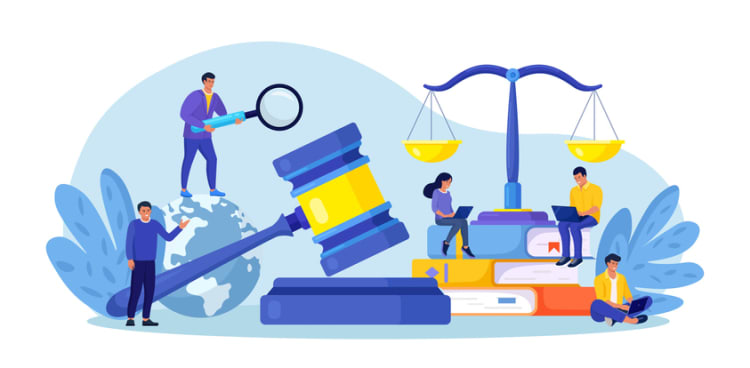In a world where trust is a valuable currency, accountability has emerged as a powerful driving force for success across various domains, from the personal to the professional. But what exactly does it mean to be accountable, and why is it so crucial in today’s increasingly interconnected and diverse landscape? Join us on a journey to unlock the essence of accountability, as we delve into its various facets, explore its significance in different spheres, and learn how to cultivate a culture of responsibility for impactful results.
Throughout this blog post, we will uncover the importance of accountability in corporate, political, media, and personal contexts, and examine real-world implications, case studies, and success stories that highlight the impact of accountability in action. We will also provide strategies for enhancing accountability in the workplace and offer insights into global perspectives on accountability. By the end of this journey, you will have a deeper understanding of the power of accountability and its essential role in driving positive change.
Key takeaways
- Understanding and applying accountability in various contexts is essential for promoting transparency, efficiency, trust, and success.
- Accountability requires transparency of outcomes while responsibility encompasses keeping pledges and assuming the effects of actions.
- Organizations should foster a culture of ownership through setting clear expectations, recognizing & rewarding accountability. Governments must enhance programs to protect citizens’ rights.
Unlocking the essence of accountability

The concept of “accountability,” originating from the 1700s, has grown into a key principle that influences our grasp of responsibility in multiple facets of life, spanning from personal to professional realms. Essentially, accountability refers to being accountable for one’s actions and decisions, especially when one wields significant power. It plays a vital role in promoting transparency, catalyzing reform, and rectifying unfulfilled commitments.
Accountability is not limited to a single domain; it is a fundamental aspect of effective teamwork and leadership, as well as a cornerstone for success in various spheres, including:
- Corporate
- Political
- Media
- Personal
By examining the diverse contexts in which accountability plays a role, we can better appreciate its significance and learn how to effectively implement it in our own lives and organizations.
The definition deep dive
Accountability is the willingness to accept responsibility for one’s performance and be held accountable for their actions. In the workplace, it ensures that team members are fulfilling their duties appropriately, taking ownership of their tasks and recognizing the consequences of their actions. This sense of accountability extends beyond the individual level, as it also encompasses the organization’s responsibility to ensure accurate financial statements, ethical conduct, and adherence to legal and regulatory requirements, including word accountability.
Understanding the difference between accountability and responsibility is vital for grasping its connotations. While both concepts are related, accountability is viewed more from the perspective of oversight, whereas responsibility refers to an allocated or self-allocated task or project. This distinction underscores the importance of fostering a culture of ownership and commitment, where individuals are not only responsible for their tasks but are also willing to be evaluated based on the execution of their duties.
Accountability vs. responsibility: clarifying the distinction
As mentioned earlier, accountability and responsibility are related but distinct concepts. Accountability implies a readiness to be evaluated based on the execution of a task or project, whereas responsibility is an allocated or self-allocated task or project. Accountability necessitates transparency and efficient communication of outcomes with all parties that may be impacted. In contrast, responsibility encompasses keeping pledges, assuming the effects of actions, abstaining from excuses, and being dependable and reliable.
Both accountability and responsibility are integral to fostering a culture of ownership. When individuals take responsibility for their actions, they demonstrate honesty and dependability. This not only builds trust with others but also enables personal growth and development. By assuming responsibility for their actions, individuals can learn from their mistakes, make necessary modifications, and strive for improved outcomes in the future.
Furthermore, personal accountability engenders a sense of authority and control over one’s life, resulting in increased self-confidence and a more profound sense of personal satisfaction.
The pillars of accountability in various spheres

Accountability is a key factor for achieving success in a variety of fields, such as corporate, political, media, and personal. As we delve into these domains, it becomes evident that accountability is a necessary mechanism for promoting transparency, honesty, and efficient administration. By integrating the concept of accountability into these different aspects of life, we can create lasting positive change and drive meaningful progress.
In the subsequent subsections, we will reveal the importance of accountability, including professional accountability, in the following realms:
- Corporate
- Political
- Media
- Personal
By understanding the unique challenges and opportunities presented in each context, we can appreciate the power of accountability as a driving force for improvement and recognize its potential for impact in our own lives and organizations.
Corporate accountability uncovered
Corporate accountability encompasses a company’s activities as they affect the community, including its environmental impact, investment decisions, and treatment of its employees. In recent years, accountability reporting has emerged as an essential tool for fostering transparent supply chains and corporate accountability. Legal frameworks, such as the role of the audit committee, play a crucial role in enforcing corporate accountability by supervising the audit process and ensuring that public companies comply with the law.
Failures in corporate accountability have resulted in serious repercussions, such as the Enron scandal and the 2008 global financial crisis, both of which were linked to insufficient oversight and lack of accountability systems. By implementing robust corporate accountability measures, organizations can mitigate risks, enhance transparency, and ensure ethical conduct.
In order to foster corporate accountability, businesses should focus on:
- Establishing clear roles and responsibilities
- Promoting a culture of transparency and open communication
- Creating systems of checks and balances that hold individuals and teams accountable for their actions
By doing so, organizations can build trust with stakeholders, maintain ethical standards, and enhance overall performance.
Political accountability and public trust

Political accountability is integral to public trust, as it encourages transparency, responsiveness, integrity, and effective governance in the political system. At its core, political accountability comprises managerial accountability and the duty to be accountable to a wider public. By holding politicians and government officials accountable for their actions and decisions, we can foster a more transparent and responsive political system that serves the needs of the people.
To boost political accountability, it’s necessary to:
- Create channels for citizen participation in politics
- Enforce checks and balances on political power
- Set up systems for holding public officials accountable for their actions
By doing so, we can ensure that the political system remains responsive, transparent, and aligned with the public interest, taking into account the role of political contributions.
Media accountability in the age of information
In the contemporary era of information, media accountability is of paramount importance, as it serves to regulate media content and hold media outlets accountable for their responsibilities to society. Media accountability ensures that news media:
- Disseminate reliable information
- Act as a watchdog to ensure accountability of societal actors
- Foster transparency and accountability in government institutions.
There are various mechanisms in place to ensure media accountability, such as:
- Independent fact-checking organizations like FactCheck.org, Snopes, and PolitiFact
- Holding media outlets accountable for their content
- Promoting transparency in reporting
By implementing these measures, we can safeguard the integrity of journalism, protect the public’s right to accurate information, and promote a more informed and engaged citizenry.
Personal accountability: owning one's actions
Personal accountability is of great importance in assuming responsibility for one’s actions, as it fosters integrity, growth, and trust. By taking accountability for their actions, individuals demonstrate honesty and dependability, building trust with others and enabling personal growth and development. Personal accountability also engenders a sense of authority and control over one’s life, resulting in increased self-confidence and a more profound sense of personal satisfaction.
In order to cultivate personal accountability, individuals should focus on:
- Embracing responsibility for their actions
- Learning from mistakes
- Seeking feedback
- Offering support to others
By doing so, they can develop a strong sense of ownership and responsibility, which can lead to personal growth, improved relationships, and greater overall life satisfaction.
Pathways to forcing accountability

Enforcing accountability can come through legal and cultural strategies, which include taking state and federal officials to court when they violate the law and cause harm to others, and nurturing a culture of accountability within organizations and the broader society. By embracing these pathways, individuals, organizations, and governments can ensure that accountability is effectively enforced across various sectors, leading to increased commitment, motivation, and productivity.
In the subsequent subsections, we will examine:
- Legal methods for enhancing accountability
- Cultural methods for enhancing accountability
- The role of legal structures and oversight mechanisms in enforcing accountability
- Strategies for nurturing a culture of accountability and responsibility in organizations and society.
Legal accountability and oversight
Legal frameworks and oversight mechanisms play a vital role in enforcing accountability across various sectors, providing a structure of rules and regulations to govern the behavior of individuals and organizations. By establishing standards of conduct, defining rights and responsibilities, and outlining the consequences for non-compliance, legal frameworks ensure that individuals and organizations are held accountable for their actions.
Institutional oversight, such as regulatory bodies or government agencies, is essential for advancing transparency, integrity, and trust in various sectors. These institutions have the authority to investigate, audit, and enforce accountability measures, such as imposing penalties or sanctions when necessary. By providing impartial and objective oversight, they play a vital role in ensuring adherence to laws, regulations, and ethical standards across different domains.
Cultivating an accountability culture
Cultivating an accountability culture involves:
- Creating an environment where individuals demonstrate high levels of ownership and take the necessary actions to achieve organizational results
- Fostering trust and psychological safety
- Setting clear expectations and defining roles
- Recognizing and rewarding accountability
By creating a culture of accountability, organizations can enhance workplace relationships, prevent unexpected outcomes, and heighten job satisfaction. Furthermore, an accountability culture not only benefits the organization but also empowers individuals to take control of their actions, leading to personal growth and development.
Accountability in action: real-world implications

By studying real-world instances and case studies, we can observe the influence of accountability in driving positive change and betterment across multiple domains. These success stories highlight the impact that accountability can have on organizations and individuals, serving as an essential tool for growth and development.
In the subsequent subsections, we will evaluate cases where a lack of accountability resulted in negative outcomes, and highlight instances where accountability drove positive change. By learning from these mistakes and successes, we can better understand the importance of accountability and its potential for impact in our own lives and organizations.
Case studies: when accountability fails
A lack of accountability can have significant consequences, as demonstrated by several high-profile corporate accountability failures, such as Enron, the 2008 global financial crisis, and the Volkswagen emissions scandal. These examples highlight the importance of proper oversight and accountability mechanisms in preventing corruption, ensuring ethical conduct, and protecting stakeholders from harm.
In the political realm, a lack of accountability can lead to too much power, resulting in:
- Corruption allegations
- A diminished level of trust
- Cynicism
- Public dissatisfaction
By holding political leaders accountable for their actions and decisions, we can foster a more transparent and responsive political system that serves the needs of the people.
In the environmental sphere, a lack of accountability and broken promises have led to major disasters, such as the Torrey Canyon oil spill, methane explosion in Mexico, and the ongoing environmental disaster in East Palestine, Ohio. These incidents underscore the need for robust accountability measures to protect the environment and the communities that depend on it.
Success stories: accountability as an essential tool

On the other hand, there are numerous success stories where accountability has served as an essential tool for driving positive change. In the political sphere, accountability has been a driving force for enhancing government effectiveness, transparency, and responsiveness to the needs of the public. By embracing accountability, politics becomes more responsive to the needs and demands of the populace.
In the media industry, independent fact-checking organizations like FactCheck.org, Snopes, and PolitiFact have played a crucial role in promoting media accountability and ensuring that news media disseminate reliable information. By holding media outlets accountable for their content and promoting transparency in reporting, we can safeguard the integrity of journalism and protect the public’s right to accurate information.
Strengthening accountability in the workplace

Accountability is a vital technique employed by successful teams to cultivate improved work relationships, prevent unexpected outcomes, and heighten job satisfaction. In order to enhance accountability in the workplace, organizations should focus on setting clear expectations, defining roles and responsibilities, and fostering a culture of transparency and open communication.
In the subsequent subsections, we will talk about strategies for boosting accountability in the workplace, which include clearly defining roles and expectations, promoting transparency and open communication, and rewarding accountability. By implementing these strategies, organizations can ensure a culture of ownership and commitment, leading to increased engagement, motivation, and productivity among team members.
Defining roles and expectations clearly
Clearly defining roles and expectations in the workplace is crucial for enhancing accountability and ensuring effective communication among team members. By providing individuals with a clear understanding of their responsibilities and what is expected of them, organizations can prevent confusion, duplication of work, and conflicts among team members.
To effectively communicate roles and expectations, organizations should outline expectations clearly, explain the importance of each role, and provide regular feedback for improvement. By doing so, organizations can create a culture of ownership and accountability, which can lead to personal growth, improved relationships, and greater overall life satisfaction.
Encouraging transparency and open communication
Fostering transparency and open communication in the workplace is crucial for cultivating a culture of accountability and trust among team members. By creating an environment where individuals feel comfortable addressing errors and assuming responsibility for their decisions, organizations can enhance collaboration, productivity, and overall team performance.
In order to encourage transparency and open communication, organizations should:
- Establish a safe and supportive environment
- Build trust through consistent and transparent communication from management
- Implement tools and technologies that facilitate communication and collaboration, particularly in remote work settings.
Rewarding accountability
Recognizing and rewarding accountability in the workplace is essential for maintaining employee commitment, morale, and engagement. By offering recognition and rewards for those displaying accountability, organizations can inspire team members to take ownership of their tasks and responsibilities, leading to improved performance and productivity.
Organizations can incentivize accountability by providing feedback, coaching, and support to reinforce the importance of accountability, and by celebrating successes and achievements related to accountability. By doing so, organizations can foster a culture of ownership and commitment, leading to increased engagement, motivation, and productivity among team members.
Enhancing government accountability programs

Government accountability is crucial for safeguarding citizens’ well-being and the efficient operation of public institutions. By enhancing the government accountability program, we can:
- Protect whistleblowers
- Ensure that government entities are held accountable through internal audits
- Foster systemic accountability across various sectors.
In order to improve government accountability programs, it is crucial to:
- Strengthen accountability measures and checks and balances
- Implement effective right to information laws
- Encourage transparency in government decision-making
By embracing these strategies, we can ensure that our governments remain accountable, transparent, and aligned with the public interest.
Global perspectives on accountability

Accountability is a universal concept, but its understanding and implementation can be influenced by cultural, regional, and historical contexts. By examining global viewpoints on accountability, we can acquire insightful understanding into the varied methods and mechanisms used to implement accountability across different regions globally.
Different cultures have distinct approaches to accountability, with some prioritizing individual accountability and others emphasizing collective responsibility. Understanding these cultural nuances is crucial for effectively implementing accountability in diverse settings. By examining the unique challenges and opportunities presented by different cultural contexts, we can better appreciate the power of accountability as a driving force for improvement and recognize its potential for impact in our own lives and organizations.
Summary
Throughout this blog post, we have explored the essence of accountability, delved into its various facets, and examined its significance in different spheres, such as corporate, political, media, and personal contexts. We have also discussed strategies for enhancing accountability in the workplace and offered insights into global perspectives on accountability.
As we have seen, accountability is a powerful driving force for success across various domains, fostering transparency, honesty, and effective administration. By embracing accountability in our own lives and organizations, we can drive positive change, promote a culture of responsibility and ownership, and achieve impactful results.
Frequently asked questions
Accountability is an obligation or willingness to accept responsibility for one's actions, decisions, and assignments. When individuals understand and accept the consequences of their actions, roles are clearer and work gets done more efficiently and effectively.
An example of accountability is when you stay focused on achieving your goals and tasks, setting a good example for your team.
Accountability involves being accountable for actions taken, while responsibility entails taking ownership of tasks and projects. It also involves keeping promises, not making excuses, and being reliable and trustworthy.
Organizations can enhance accountability in the workplace by setting clear expectations, defining roles and responsibilities, fostering transparency and open communication, and rewarding accountability.





